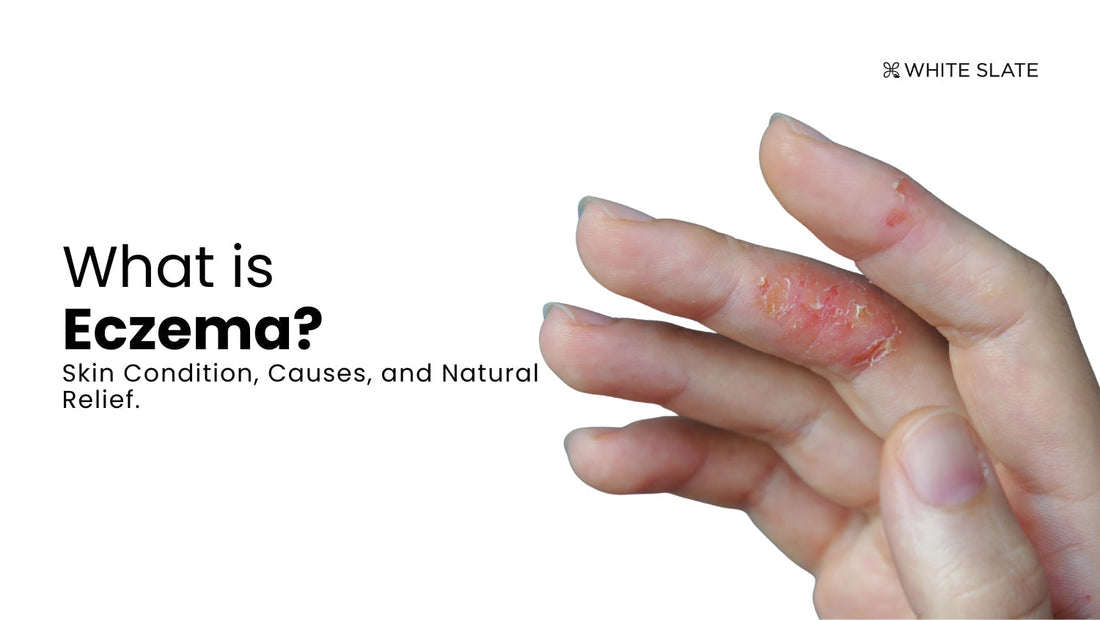Eczema, or atopic dermatitis, is an ongoing skin disorder that causes the skin to become red, itchy, dry, and inflamed. It is an extremely prevalent skin disorder around the world and can strike anyone at any age, particularly children. Having eczema can hurt and be exhausting, but getting educated about the condition is the key to controlling it successfully.
What is eczema?
Eczema is not a single disease; it is a collection of diseases that make the skin red or inflamed. It occurs when the natural barrier of the skin is compromised, leaving it more vulnerable to irritants that may affect it, including allergens and environmental triggers.
The common characteristics of eczema include severe itching, redness, and scaling, with occasional oozing or bleeding. Eczema is not contagious but can be inherited genetically or caused by contact with external agents.
Types of Eczema and Causes
There are a number of different eczemas, and each has a cause and appearance. It will be useful in treatment and prevention to know what kind it is:
1. Atopic Dermatitis
- Most common form.
- Often runs in families and is linked to other allergic conditions like asthma or hay fever.
- Triggered by allergens, stress, and dry skin.
2. Skin Allergies
- Due to direct contact with irritants (e.g., soaps, detergents) or allergens (e.g., nickel, perfume).
- Divided into irritant and allergic contact dermatitis.
3. Dyshidrotic Eczema
- Affects hands and feet.
- It consists of tiny, itching blisters.
- Usually associated with stress, humidity, or metal sensitivity.
4. Nummular Eczema
- Coin-sized patches of red skin.
- Can happen after a skin trauma or dry weather.
- Hard to distinguish from fungal infections without proper testing.
5. Seborrheic Dermatitis
- Affects oily skin such as the scalp, face, and chest.
- Due to yeast overgrowth or immune reaction.
- This is called "cradle cap" in babies.
6. Stasis Dermatitis
- Happens in the lower legs because of inadequate blood circulation.
- Causes swelling, redness, and scaling.
What causes Eczema?
The actual cause of eczema is still unknown, but it is believed to be induced by genes and the environment. The breakdown is as follows:
Internal Causes:
Genetics: Family history of eczema, asthma, or hay fever raises risk.
Immune System Response: Overactive immune system may respond vigorously to weak irritants.
Hormonal Fluctuations: Women may have flare-ups during pregnancy or menstruation.
External Triggers:
- Strong Soaps and Cleansers
- Synthetic or wool clothing
- Allergens including dust mites, pollen, or pet dander
- Stress and emotional cues
- Extreme temperatures or humidity
- Poor skin care routine or over-exfoliation
Most people with eczema report symptomatic improvement when they apply fragrance-free, alcohol-free, and preservative-free natural creams and lotions for the skin. These tend to have moisturizing ingredients such as aloe vera, calendula, chamomile, or colloidal oatmeal, which soothe the skin and assist in the preservation of the natural skin barrier.
What are the signs of eczema?
Symptoms may be mild or severe and may change with age, skin type, or the type of eczema.
- Itching: Typically severe and worse at night.
- Brown spots or red-brown-gray spots: Typically on the face, hands, feet, or back of knees.
- Dry, cracked, or scaly skin
- Thick or hard spots
- Blisters or open sores (in more extreme cases)
- Sensitivity to touch or temperature changes
In children, eczema manifests on the cheeks, scalp, or outer arms and legs. In adults, it is usually seen on the inside elbows, back of the knees, neck, or hands.
Natural Cures for Eczema Treatment
Eczema is not curable, but it can be controlled by means of good skin care, change in the daily routine, and sometimes medication. Natural skincare products are used by most people to improve their condition because they are gentle and hardly cause irritation to the skin.
How to Soothe and Avoid Eczema:
Moisturize Often: Use a fragrance-free, hypoallergenic cream or ointment many times daily.
Use natural products for your skin: Search for products containing shea butter, coconut oil, aloe vera, or ceramides.
Avoid Hot Showers: Use warm showers and keep baths for 10 to 15 minutes.
Wear Breathable Fabrics: Cotton is best. Avoid synthetic materials and wool.
Manage Stress: Mindfulness, yoga, and deep breathing may help prevent flare-ups.
Avoid Triggers: Keep a diary to track food, environment, and skincare products that might trigger symptoms.
When these natural remedies fail, dermatologists can prescribe topical corticosteroids, antihistamines, or immunosuppressants in extreme cases.
FAQs Regarding Eczema
Q1: Is eczema contagious?
No, eczema is not contagious and cannot be transmitted from one individual to another.
Q2: Does eczema ever disappear?
Eczema may improve for a period, particularly in children, but it is normally a chronic condition that requires constant treatment.
Q3: Is eczema influenced by diet?
Yes, this is true for some people. Common triggers are dairy, gluten, nuts, and processed foods. Eating an anti-inflammatory diet might help.
Q4: Are natural skincare products suitable for eczema?
They are gentler on sensitive skin and may reduce irritation. Always check those that are labeled fragrance-free and allergy-tested.
Q5: When should I see the doctor?
If eczema is not improving with over-the-counter remedies or is disrupting sleep or daily activities, consult a skin specialist.
Disclaimer
This blog is informational only and not intended to replace professional medical treatment. If you suspect you have eczema or another skin disorder, please see a board-certified dermatologist. Natural skincare can be utilized to help symptoms, but results will differ for all individuals based on skin type and what triggers their condition.

